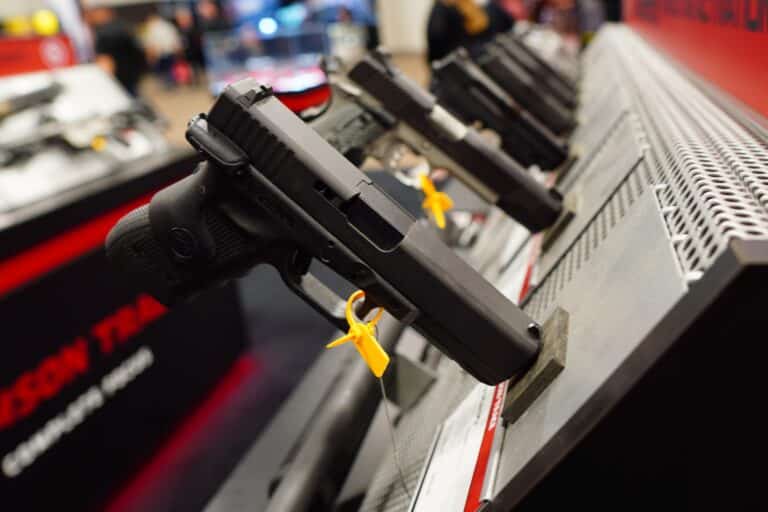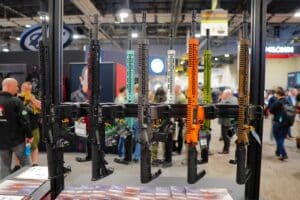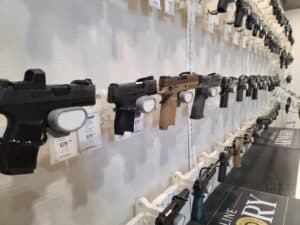Just because a bill passes with veto-proof majorities doesn’t mean those votes always stick around when it really counts.
Huge majorities in the North Carolina legislature just passed a wide-ranging gun bill that includes a repeal of the state’s 104-year-old law requiring a permit to purchase a handgun. The final vote came on Wednesday when the state House gave its stamp of approval with the support of three Democratic legislators. Those three House Democrats, and whether or not they hold firm in their support for the bill, will determine if repeal makes it across the finish line.
Unlike the state senate, where Republicans now hold a veto-proof majority, North Carolina House Republicans must be able to count on at least one Democratic vote to override a veto from Governor Roy Cooper (D.). And though he hasn’t publicly signaled one way or another what he intends to do with the bill now that it’s on his desk, all signs point to a likely veto.
Cooper vetoed separate bills to repeal the permit-to-purchase law and allow licensed concealed carry during religious services on school grounds back in 2021. Both policies are included in Senate Bill 41, and he hasn’t offered any public comment suggesting his views on either policy have changed.
On paper, supporters of the bill should feel pretty confident in their prospects despite the Governor’s opposition. After all, even if two Democrats defect in the face of a tough veto override vote, the bill can still make it into law, provided everyone else stands firm. However, a recent example from another southern state serves as a cautionary tale that a veto override is no guarantee, even when a bill initially passes with huge margins of support.
In 2021, gun-rights supporters in Louisiana were riding high when the state legislature approved a permitless carry bill. The state’s Democratic Governor, John Bel Edwards, told lawmakers ahead of time that he would veto the measure if and when it made it to his desk, but they were undeterred. During its initial passage, the state House voted for it 73-28, and the Senate voted for it 27-9 —both above the two-thirds margins required to override a veto.
However, multiple lawmakers balked when it came time to take the actual veto override vote. The initial 27-9 margins in the Senate turned into a 23-15 vote when it mattered most, and the override failed. Not only did both Democrats who initially supported the bill change their votes, but three Republicans joined them in defecting as well. Another Republican who voted for it the first time didn’t show up for the override vote.
The experience in Louisiana demonstrates that voting to help pass a bill that would clear the chamber with or without your vote is an entirely different proposition from voting to override a veto issued by a member of your own party. In some cases, apparently, voting to override the opposing party can be equally daunting.
What makes matters more challenging for supporters of SB 41 is that Governor Cooper enjoys relative popularity among the voting public in North Carolina despite the state’s red tilt. His above-average approval ratings make it harder for lawmakers to go against him in a high-profile legislative battle.
The North Carolina GOP’s best hope for a Democrat willing to stand behind Senate Bill 41 likely lies in state Representative Michael Wray (D.). Wray initially co-sponsored a standalone House Bill to repeal the pistol purchase permit requirement, and he voted in favor of Senate Bill 41 when it cleared the legislature.
However, he has also already shown a willingness to cave to political pressure on the policy. He actually voted against his own bill in the House after saying a local sheriff in his district expressed discomfort with the proposal. It’s unclear what changed between then and now to cause him to support repealing the permit-to-purchase law again, but his track record of flip-flopping is not a positive sign for those hoping he stands firm against the Governor.
It’s certainly possible that North Carolina lawmakers will continue to have the votes to make the state’s pistol purchase permit requirement a relic of history. They are closer than they have ever been. But the high-stakes nature of a bipartisan veto override, especially when a hot-button political issue like gun sales is involved, makes the likelihood that a few lawmakers get cold feet that much higher.






